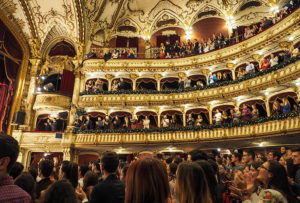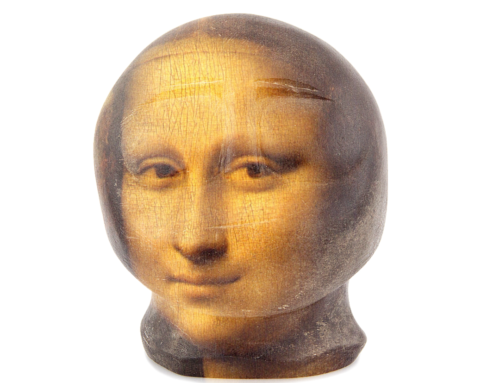 Last month, feeling crushed by the political debacle of Brett Kavanaugh’s confirmation to the Supreme Court, Lona and I went to the opening of Giuseppe Verdi’s La Traviata, the first performance of the 2018 – 2019 season at the Kennedy Center. I was looking forward to a special evening at an opera I love.
Last month, feeling crushed by the political debacle of Brett Kavanaugh’s confirmation to the Supreme Court, Lona and I went to the opening of Giuseppe Verdi’s La Traviata, the first performance of the 2018 – 2019 season at the Kennedy Center. I was looking forward to a special evening at an opera I love.
Once in the grand Opera House, I turned off my cell phone, which left me disconnected from the outside world and alone with myself – and about 3,000 others at the sold-out performance. The lights dimmed; the artistic director, Francesca Zambello, welcomed the audience and introduced the new managing director, Timothy O’Leary. After his introductory remarks, he told the audience to rise for the National Anthem, which I did obediently in synchrony with everyone else. When the orchestra started, I looked around. Many in the audience were singing along with the orchestra. I didn’t recognize a soul, although I’ve been a season subscriber to the National Opera for almost 40 years. The date and population of strangers had changed, but it seemed that time stood still: I was still a pebble in the sand.
Usually the National Anthem inspired a sense of belonging and pride in my country. I still had these patriotic feelings, but now they were invaded by thoughts of the football players that kneeled during the anthem, not out of disrespect, as claimed by the present administration, but to protest the de-legitimization, lies and violence eroding our democracy.
“Would I have the courage to kneel, even in my relatively isolated box seat where few would notice?” I asked myself.
Scattered members of the audience placed their right hand over their hearts as a sign of patriotism. “What’s the prevailing feeling in this group of opera lovers when they hear the National Anthem?” I wondered. My heart was bouncing back and forth between my former pride in country and my present sadness and concern for the loss of dignity and values of the past.
Suddenly I thought of Germany in the 1930s, before I was born. My father was there, which made me feel somehow connected with those terrible times by heritage. The mind is not confined by the bookends of birth and death. I imagined elegant ladies and gentlemen interspersed with soldiers in pressed uniforms and polished boots in an audience singing the German National Anthem before a concert, perhaps even a concert in which my father was the featured cellist as soloist before he escaped from Europe to freedom with my mother and sister in the United States.
“Stop!” I demanded silently. “We’re Americans in the 21st century. History does not repeat itself; it unfolds, always in surprising ways with new twists. What are the similarities with the past, what are the differences?” I asked myself. “How can I even recognize what will be significant history as it’s being made?”
Would I have the courage to kneel, even in my relatively isolated box seat where few would notice?
I’ve seen La Traviata multiple times. Yet, that night, there was a surprise. In the opening scene, Violetta, the tragic fallen woman, was in the hospital lying on her deathbed. “What’s this?” I wondered. “Something new?” The artistic director was playing games with us! Violetta soon jumped out of bed and the scene flipped to the party, as usual, where Alfredo declares his love for her. The opera finished back in the hospital, as it had started, where Violetta died. Always before I’d seen this opera progressing in real time; now, some 160 years after its first production, it was performed as a flashback.
“It’s never too late for innovation and change,” I thought. “There are always new opportunities.”
How to communicate the inseparable mix of story and music that I felt listening to Verdi’s La Traviata? Already in the first act when Violetta appears healthy (although she isn’t), I felt the magic of art, which has always glittered on the horizon for me, and though abstract, provided a driving force for whatever I undertook. Throughout the opera, I bathed in the luxury of listening to a self-explanatory language that, paradoxically, defied words.
The mind is not confined by the bookends of birth and death.
The young and beautiful Russian singer, Venera Gimadieva, sang the role of Violetta. Her coloratura and lyric soprano voice made me think of The Miracle of Estelle, a short story I wrote that was recently published in Adelaide Literary Magazine. Benjamin, one of the characters, was in synagogue for Rosh Hashanah, when he was enraptured by a voice in the choir he had never heard before. “It had a wondrous quality…so fine that it sounded like a single violin string caressed by a bow containing a hair plucked from the head of a child-angel…free like air filling the sanctuary, entering his body with every breath.” Gimadieva incorporated my love of opera into my passion for writing. Art is art, after all, whatever the medium.
Gimadieva had another unexpected, positive effect on me. She trained in St. Petersburg Music Conservatoire, became a soloist in the Bolshoi Theatre in 2011 and now tours the world to much acclaim. I couldn’t help but think of my father, who became the principal cellist at the Bolshoi in the early 20th century while still a teenager. Like Gimadieva, my father had strong emotional and sentimental overtones as a musician. Art creating invisible bonds again extending earlier than my birth and rooted in genetics and culture. It made me think about how we become who we are, and how that affects how we view our needy, chaotic world, full of contradictions.
Later, I was taken aback when I read that Anne Midgette, a music critic for the Washington Post, piled criticisms claiming pitch and other issues on Gimadieva’s performance in the same La Traviata I loved. I cannot counter her comments; indeed, I would not recognize small musical problems or technical errors. However, I know that I was completely won over by what I considered an extraordinary performance and enthusiastically joined virtually everyone in the packed, appreciative audience – clearly moved by her performance. In the final round of bows, one of the singers pushed Gimadieva from behind to the front of the stage to stand alone and acknowledge the ovation, which she richly deserved in my opinion.
Years ago, my father told me how despondent critics could make him feel. “It’s like a cat scratching my eyes out!” he said. When I asked him why a critic’s comments could override standing ovations and public accolades for him, he said, “It’s because they establish success or failure in our profession. The critics wield great power over us artists.”
I understood. People choose to go to movies anointed with four stars by critics and to read books heralded with awards, letting the others collect dust on the shelf. I, too, cannot ignore or forget criticism or be insensitive to its nasty residue.
Yet, art is personal and succeeds by reaching us individually. To me, Gimadieva’s La Traviata was an exquisite reminder of the transcending beauty of art – a powerful spokesman for humanity, a soothing balm for our open sores and a guide to inspire us to greater heights.






Leave A Comment